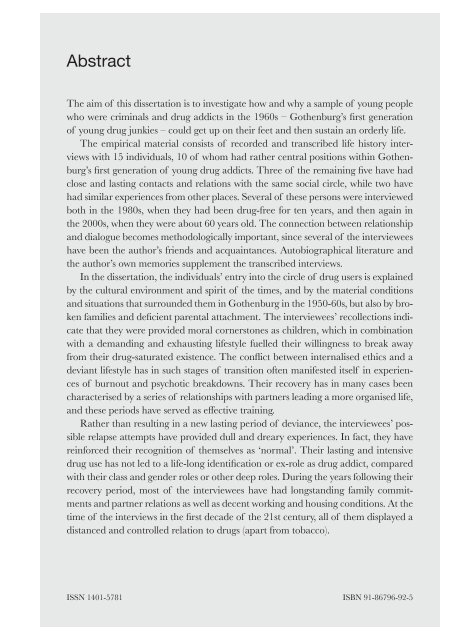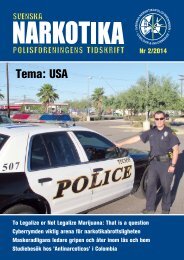- Page 1 and 2: Vänskap värden vandel Avvikelser
- Page 3 and 4: Christer Ahlman Vänskap, värden,
- Page 5: Till Birgit, Gunilla och Ingrid
- Page 10 and 11: Metod 45 Tillträde 45 Samtalssitua
- Page 12 and 13: DEL 4 KRISER, ÖVERGÅNGAR OCH BEST
- Page 15 and 16: Förord Denna avhandling skildrar e
- Page 17: DEL 1 Avhandlingens avsikt, metoder
- Page 20 and 21: devalveras och reduceras till knark
- Page 22 and 23: varaktig verksamhet och inte bara n
- Page 24 and 25: en analys av intervjuer med ett ant
- Page 26 and 27: många av de citat som förkommer i
- Page 28 and 29: uppsättning och djupa roller. 4 Ge
- Page 30 and 31: Analytiskt indelas de intervjuade p
- Page 32 and 33: Rollernas djup och status Avhandlin
- Page 34 and 35: ingångsvärden, sin personlighet o
- Page 36 and 37: Multipla roller och en identitet No
- Page 38 and 39: stå som medfödda. Daniel Stern (2
- Page 40 and 41: ehandlar också självspolierande a
- Page 42 and 43: ättade tillsammans med tio medlemm
- Page 44 and 45: tre var aktiva redan under 1950-tal
- Page 46 and 47: Tabell 1: Översikt över intervjua
- Page 48 and 49: en och metoderna i den genre som ä
- Page 50 and 51: samma vis kan det vara av vikt för
- Page 52 and 53: ter som Parsons (1965b) för att st
- Page 54 and 55: personer som medverkat i intervjusa
- Page 56 and 57:
Målområden och samtalsformer Ist
- Page 58 and 59:
fru. Mellan åren 1938 och 1944 ned
- Page 60 and 61:
plats för externa infall och uppsl
- Page 62 and 63:
Egna upplevelser, deltagande observ
- Page 64 and 65:
sådan situation ha reducerat mig f
- Page 66 and 67:
hetskänslornas och avvikelsernas i
- Page 68 and 69:
inom områden som våld, sexualitet
- Page 70 and 71:
öka tankeobjektets klarhet genom p
- Page 72 and 73:
har förståelsen resulterat i en g
- Page 74 and 75:
prata om en gemensam bekant, en pro
- Page 76 and 77:
mina egna erfarenheter skulle få b
- Page 78 and 79:
fråga om varför han inte slutade
- Page 80 and 81:
överlever även denna omgång. En
- Page 82 and 83:
surera bytesjakten och prägla slut
- Page 85 and 86:
Introduktion till del 2 Del 2, kapi
- Page 87:
varm te. En mig bekant bohemisk pun
- Page 90 and 91:
”Något hade hänt”, och i skol
- Page 92 and 93:
kassan och andra hade klippt hål i
- Page 94 and 95:
slogs. Under några år var också
- Page 96 and 97:
via beatnikstilens och modsens 64 m
- Page 98 and 99:
av en stålkam och en tub trögt h
- Page 100 and 101:
”ingenstans att bo heller, så ma
- Page 102 and 103:
den gruppen som var nyfiken och gä
- Page 105 and 106:
KAPITEL 4 Marknadsplatser, träffpu
- Page 107 and 108:
elägna och undanskymda rutter anv
- Page 109 and 110:
likvärdiga villkor, uppvuxen inom
- Page 111 and 112:
på injektionsmedel”: ”Det där
- Page 113 and 114:
doserna kunde spädas ut i flera le
- Page 115 and 116:
Under 1950-talet såg några mer el
- Page 117 and 118:
utan började omedelbart injicera P
- Page 119 and 120:
Verkligt eftertraktade flickor kund
- Page 121 and 122:
eroende och använde därför tilld
- Page 123:
på samma sätt som en mättad inje
- Page 126 and 127:
den därpå följande boomen i Norr
- Page 128 and 129:
Utarmning och klimatförbistring so
- Page 130 and 131:
huldad föreställning vad gällde
- Page 132 and 133:
vas arbetslöshet eller bostadsbris
- Page 134 and 135:
talet upptäckte de centralstimuler
- Page 137:
DEL 3 Entré och sorti Denna del be
- Page 140 and 141:
föräldrarnas mer eller mindre avv
- Page 142 and 143:
till fäder som suiciderade. Ingen
- Page 144 and 145:
lem i det längsta. Han liksom ”h
- Page 146 and 147:
Hisingen. Anstalten var inrättad f
- Page 148 and 149:
korridoren” men det fanns också
- Page 150 and 151:
trädande och iögonfallande positi
- Page 152 and 153:
i alla fall då flickorna var små,
- Page 154 and 155:
familjemönster vidare. Under kriti
- Page 156 and 157:
av de borgerliga männen mer splitt
- Page 159 and 160:
KAPITEL 7 Självförändrande relat
- Page 161 and 162:
Utanförskap Lösryckta, på flykt
- Page 163 and 164:
dens många hårdföra barn- och un
- Page 165 and 166:
lyckades upprätta en intim relatio
- Page 167 and 168:
något knark då”. Men bara någo
- Page 169 and 170:
tive konstnär eller beatnik, kunde
- Page 171 and 172:
kom blev till förmån för hennes
- Page 173 and 174:
en gång blev han far och åter bö
- Page 175:
DEL 4 Kriser, övergångar och best
- Page 178 and 179:
människan själv fäster vid akten
- Page 180 and 181:
mad”. I väntan på plats vid en
- Page 182 and 183:
vad dum han var”. Trots nära kon
- Page 184 and 185:
kunde värna ganska svartsjukt om s
- Page 186 and 187:
i bilden. Han liksom så många and
- Page 188 and 189:
han sig vid samtalstillfällena med
- Page 190 and 191:
Urvalets äldsta mansperson, även
- Page 192 and 193:
annan man påpekar mer frankt att h
- Page 194 and 195:
Om en ung människa ideligen skuffa
- Page 196 and 197:
pojkvän. Kvinnan nämner också at
- Page 198 and 199:
örjade hon ”staka ut” en ny v
- Page 200 and 201:
last på hyllan. Både menar sig nu
- Page 202 and 203:
Ångest, panik och psykoser Krossas
- Page 204 and 205:
hade några ”moralbegrepp” alls
- Page 206 and 207:
hon var där. Några intervjuade ha
- Page 208 and 209:
som en njutningsfylld konstart. ”
- Page 210 and 211:
med bekymmer ringer mitt under vår
- Page 212 and 213:
hade sannolikt fått en annan karak
- Page 214 and 215:
fakta sparka. Någon minns en gamma
- Page 216 and 217:
Val och öde De människorna som sk
- Page 219 and 220:
KAPITEL 10 Bevärdigande Kapitl
- Page 221 and 222:
på en följsamhet för vad som lig
- Page 223 and 224:
”det viset” har hon varit ”bu
- Page 225 and 226:
hållande med någon narkotikakonsu
- Page 227 and 228:
männen haft fortlöpande kontakter
- Page 229 and 230:
någon är aktiv inom kyrkan och fl
- Page 231:
DEL 5 Interaktion och rekvalifikati
- Page 234 and 235:
pionjärer och veteraner bli de hip
- Page 236 and 237:
kritik som de närståendes invänd
- Page 238 and 239:
esande 152 valde ofta att tiga stil
- Page 240 and 241:
Med tilltagande självkännedom kan
- Page 242 and 243:
kvar och fjättras i form av en ex-
- Page 244 and 245:
ungdomsbrottsling eller narkoman li
- Page 246 and 247:
Mandalans arkitektur Figur 1: Manda
- Page 248 and 249:
Mandalan antas rulla fram, avsätta
- Page 250 and 251:
uppfattningen och självkänslan. M
- Page 252 and 253:
långt behöver förståelsens soci
- Page 254 and 255:
na avhandling kan också tränga dj
- Page 256 and 257:
122) när han beskriver en av sina
- Page 258 and 259:
1960-talets mer bohemiska och antiv
- Page 260 and 261:
intagningsritualer (Garfinkel 1956:
- Page 262 and 263:
siska existens eller underminerar h
- Page 264 and 265:
människans tidsliga och rumsliga u
- Page 266 and 267:
drang-perioder. 193 Tyvärr hörde
- Page 268 and 269:
eller rent av dela omgivningens upp
- Page 270 and 271:
ligt att tala om beteenden och reak
- Page 272 and 273:
inträffade under en epok när lags
- Page 275:
DEL 6 Avslutning
- Page 278 and 279:
De första unga injektionsnarkomane
- Page 280 and 281:
avslutande höjdpunkt på ett decen
- Page 282 and 283:
har framför allt utmärkt dessa m
- Page 284 and 285:
iska för att till sist mäkta med
- Page 286 and 287:
antal människor Inom den tidiga ko
- Page 288 and 289:
are eller en bra mor”. De dilemma
- Page 290 and 291:
Det förflutnas röst ”Det är va
- Page 292:
domar nödgats kliva ur ramen för
- Page 295 and 296:
Blomqvist, Jan (2007) ”Self-Chang
- Page 297 and 298:
Habermas, Jürgen (1979) Communicat
- Page 299 and 300:
Magni, Klas G. (1967) Omvända alko
- Page 301 and 302:
Veblen, Thorstein ([1899] 1998) The
- Page 303 and 304:
Gegg: Geggare: Gig: Gola: Gno: Gnoa
- Page 305:
Sne(d)tändning: Intensivt obehagli
- Page 308 and 309:
also significant. The first young i
- Page 310 and 311:
ilies and environment than a will t
- Page 312:
Sensitivity and uncertainty, tongue



